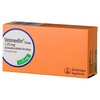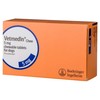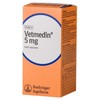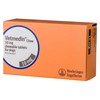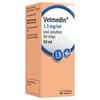Vetmedin
Vetmedin is used for the treatment of canine congestive heart failure originating from valvular insufficiency (mitral and/or tricuspid regurgitation) or dilated cardiomyopathy.
Vetmedin is available in tablets of various strengths and 5mg capsules. The tablets are brownish in colour and oval in shape, and are scored on both sides so that they can be divided into equal parts. The capsules are hard capsules and are white to orange in colour.
Vetmedin 1.25mg Flavoured Tablet for Dogs
£0.25Vetmedin 1.25mg Tablets are indicated to treat dogs with congestive heart failure caused by two types of heart disease: Mitral Valve Disease (MVD) and Dilated Cardiomyopathy (DCM). Vetmedin...[More info]
Vetmedin 5mg Flavoured Tablets for Dogs
£0.77Vetmedin 5mg Tablets are indicated to treat dogs with congestive heart failure caused by two types of heart disease: Mitral Valve Disease (MVD) and Dilated Cardiomyopathy (DCM). Vetmedin...[More info]
Vetmedin 5mg Capsules for Dogs
£0.54Vetmedin 5mg Hard Capsules are indicated for the treatment of dogs with congestive heart failure caused by two types of heart disease: Dilated Cardiomyopathy (DCM) and Mitral Valve Disease...[More info]
Vetmedin 10mg Flavoured Tablets for Dogs
£1.40Vetmedin 10mg Tablets are indicated to treat dogs with congestive heart failure caused by two types of heart disease: Mitral Valve Disease (MVD) and Dilated Cardiomyopathy (DCM). Vetmedin...[More info]
Vetmedin 1.5mg/ml Oral Solution for Dogs 50ml
£31.00Vetmedin 1.5mg/ml Oral Solution is indicated for the treatment of canine congestive heart failure originating from dilated cardiomyopathy or valvular insufficiency (mitral and/or tricuspid...[More info]
Contra-indications, warnings, etc
Do not use pimobendan in hypertrophic cardiomyopathies or in diseases in which an improvement in cardiac output cannot be achieved for functional or anatomical reasons (e.g. aortic stenosis). Since pimobendan is metabolised mainly via the liver, it should not be used in dogs with severe impairment of liver function.
The product has not been tested in cases of asymptomatic DCM in Dobermans with atrial fibrillation or sustained ventricular tachycardia.
The product has not been tested in cases of asymptomatic myxomatous mitral valve disease in dogs with significant supraventricular and/or ventricular tachyarrhythmia.
Special precautions for use in animals
The blood glucose should be tested regularly during treatment in dogs with existing diabetes mellitus.
For use in the "preclinical stage" of dilated cardiomyopathy (asymptomatic with an increase in left ventricular end-systolic and end-diastolic diameter), a diagnosis should be made by means of a comprehensive cardiac examination (incl. echocardiographic examination and possibly Holter monitoring).
For use in the preclinical stage of myxomatous mitral valve disease (stage B2, according to ACVIM consensus: asymptomatic with mitral murmur ≥3/6 and cardiomegaly due to myxomatous mitral valve disease), a diagnosis should be made by means of a comprehensive physical and cardiac examination which should include echocardiography or radiography where appropriate. (See also 'Further Information' section).
Monitoring of cardiac function and morphology is recommended in animals treated with pimobendan.
The tablets are flavoured. In order to avoid any accidental ingestion, store tablets out of reach of animals.
In rare cases a slight positively chronotropic effect (rise in heart rate) and vomiting can occur. However, these effects are dose-dependent and can be avoided by reducing the dose.
In rare cases transient diarrhoea, anorexia or lethargy have been observed.
In rare cases, an increase in mitral valve regurgitation has been observed during chronic pimobendan treatment in dogs with mitral valve disease.
Although a relationship with pimobendan has not been clearly established, in very rare cases, signs of effects on primary haemostasis (petechiae on mucous membranes, subcutaneous haemorrhages) may be observed during treatment. These signs disappear when the treatment is withdrawn.
The frequency of adverse reactions is defined using the following convention:
- very common (more than 1 in 10 animals treated displaying adverse reactions)
- common (more than 1 but less than 10 animals in 100 animals treated)
- uncommon (more than 1 but less than 10 animals in 1,000 animals treated)
- rare (more than 1 but less than 10 animals in 10,000 animals treated)
- very rare (less than 1 animal in 10,000 animals treated, including isolated reports).
Laboratory studies in rats and rabbits have not produced any evidence of teratogenic or foetotoxic effects. However, these studies have shown evidence of maternotoxic and embryotoxic effects at high doses, and have also shown that pimobendan is excreted into milk. The safety of the product has not been assessed in pregnant or nursing bitches. Use only according to the benefit/risk assessment by the responsible veterinarian.
In pharmacological studies no interaction between the cardiac glycoside strophanthin and pimobendan was observed. The pimobendan-induced increase in cardiac contractility is attenuated by the calcium antagonists verapamil and diltiazem and by the β-antagonist propranolol.
An overdose may cause a positive chronotropic effect, vomiting, apathy, ataxia, heart murmurs or hypotension. In this situation, the dosage should be reduced and appropriate symptomatic treatment should be initiated.
In prolonged exposure (6 months) of healthy beagle dogs at 3 and 5 times the recommended dose, mitral valve thickening and left ventricular hypertrophy were observed in some dogs. These changes are of pharmacodynamic origin.
Special precautions to be taken by the person administering the veterinary medicinal product to animals
In case of accidental ingestion, seek medical advice immediately and show the package leaflet or the label to the physician.
Wash hands after use.
Advice to doctors: accidental ingestion, especially by a child, may lead to the occurrence of tachycardia, orthostatic hypotension, flushing of the face and headaches.
